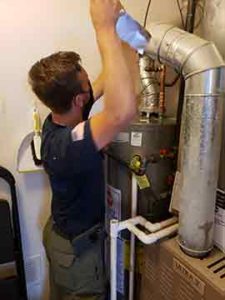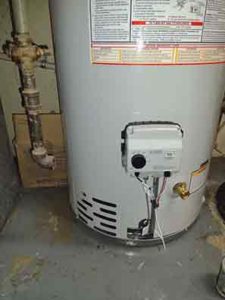Water heaters are one of the most used appliances in the home. They are the reason you can turn the tap and expect an instant supply of warm water. Water heaters make everyday household activities like taking a shower, washing the dishes, or doing the laundry so much easier.
This is why water heater malfunctions can be so utterly disruptive to your lifestyle. Until it breaks down, most of the time your water heater does its work unnoticed in an out-of-the-way corner of the home. The only water heater that gets attention is one that is not working.

But why do water heater malfunctions happen? How can you detect small issues with the water heater before they become big problems? What are the most common water heater malfunctions and how can you avoid or fix them? Find the answers to these questions in this post.
5 common water heater problems and what to do about them
Insufficient or extremely hot water
Sometimes a water heater will not produce enough hot water or the water is too hot. This is a fairly common problem. To fix it, go to the water heater tank and adjust the thermostat. You may have turned the thermostat down during the summer (to save energy) but forgot to turn it up in winter. Thermostat settings may also change if the water heater is bumped accidentally. If the water temperature doesn’t change after you do this, you may need to replace the thermostat.
A water heater will also have water temperature issues if the tank is leaking, the temperature relief valve has stopped working, the gas control or burner assembly is damaged, or there are mineral deposits in the tank. Temperature-pressure relief valves are easily replaced. You can flush the tank to get rid of deposits. But if the tank is leaking, it is probably time to get a new water heater.
Discolored water
Water discoloration is often caused by a high iron and copper content in the water. If the water in your area has a high mineral content, it will cause problems in the components of the plumbing system and the water heater. You may have issues with lime deposits in pipes, showerheads, and taps. This will show up as scaling inside the water heater, washing machine, and dishwasher. If scale builds up long enough inside a water heater, the appliance will start producing discolored water.
Water discoloration is mostly caused by rust (which is accelerated by scale deposits) or anode rod issues. Depending on how soon you detect the problem, it can easily be fixed, that is if the issue is from the anode rod. If the water from the municipality has high mineral content, you can solve it by installing a whole house water filter or water softener.
Smelly water
Water coming from the water heater may have a bad odor, smell of rotten eggs, sewage, or garlic. If this issue is not noticed with all the faucets in the entire home, it may not be from the water heater. Sometimes water will become smelly if it has not been used for a long time. Running the taps in your home for a while will solve the problem.
If this doesn’t resolve the situation, the water heater could be the cause. Rotten egg and sewage smells are caused by heavy bacteria growth inside the tank. This can be fixed by flushing the tank. A garlic-like smell means you need to relight the pilot light. Gas line damage will also cause a strong smell. If the problem persists, get an expert to inspect the appliance.
Strange noises from the water heater
A noisy water heater may be suffering from excessive mineral buildup and sedimentation. Mineral buildup comes from the water and, as already explained, is worse in areas with hard water. Sedimentation may also happen as a result of issues with the heating element. If you hear the sound of boiling water from the water heater, the system is dangerously overheating due to extreme pressures inside the tank. You need a professional plumber to fix these kinds of problems.
Leaking water heater
Leaks can happen in different parts of the water heater. Leaks caused by a loose in-line valve are easily fixed. This is the valve that controls the flow of water in and out of the tank. To fix the problem, simply tighten the nut that holds the valve in place. If the leak gets worse, you may need another in-line valve. Pressure relief valves can also leak, but they are also easy to replace.
In addition to the above, the water heater may leak because of age, bad plumbing connections, poor maintenance, corrosion, and too much pressure inside the tank. If you find that water pools near the water heater or there is dripping water from the unit, you have a leak. Most of the time, leaks from the water heater tank means your water heater needs to be replaced.
